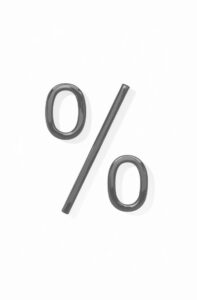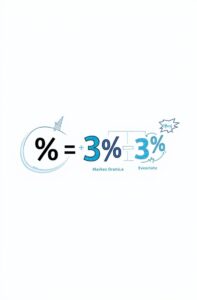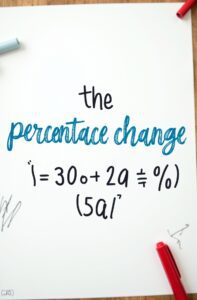Percentage Calculator – Made for Canadians
Easily Calculate Any Percentage
Enter any two values below and click “Calculate” to find the third value instantly.
Perfect for calculating sales tax (GST/HST), tips, discounts, and more — all in Canadian dollars.
What is a percentage?
In mathematics, a percentage represents a fraction of 100. It’s a simple way to express proportions or comparisons — often shown with the symbol “%”.
For example:
-
35% = 0.35 = 35 out of 100
-
25 out of 50 students = 50%
In Canada, percentages are commonly used for:
-
Sales taxes (GST, HST, PST)
-
Interest rates
-
Discounts and markups
-
Grades and statistics


Percentage formula
Although the percentage formula can be written in different forms, it is essentially an algebraic equation involving three values.
P × V1 = V2
P is the percentage, V1 is the first value that the percentage will modify, and V2 is the result of the percentage operating on V1. The calculator provided automatically converts the input percentage into a decimal to compute the solution. However, if solving for the percentage, the value returned will be the actual percentage, not its decimal representation.
Example:
P × 30 = 1.5
P = 1.5⁄30 = 0.05 × 100 = 5%
If solving manually, the formula requires the percentage in decimal form, so the solution for P needs to be multiplied by 100 in order to convert it to a percent. This is essentially what the calculator above does, except that it accepts inputs in percent rather than decimal form.
Percentage difference formula
The percentage difference between two values is calculated by dividing the absolute value of the difference between the two numbers by the average of those two numbers. Multiplying the result by 100 converts it into a percentage. The formula below illustrates this process clearly.


Percentage change formula
Percentage increase and decrease are calculated by computing the difference between two values and comparing that difference to the initial value. Mathematically, this involves using the absolute value of the difference between two values then dividing the result by the initial value, essentially calculating how much the initial value has changed.
The percentage increase calculator above computes an increase or decrease of a specific percentage of the input number. It basically involves converting a percent into its decimal equivalent, and either subtracting (decrease) or adding (increase) the decimal equivalent from and to 1, respectively. Multiplying the original number by this value will result in either an increase or decrease of the number by the given percent. Refer to the example below for clarification.
EX: 500 increased by 10% (0.1)
500 × (1 + 0.1) = 550
500 decreased by 10%
500 × (1 – 0.1) = 450
Common Canadian Uses for This Calculator
-
Find sales tax (GST/HST/PST) on purchases
-
Calculate discounts and markups
-
Compare investment growth or losses
-
Determine grade percentages
-
Work out tip amounts at restaurants

More Tools By AceCalculator.com
Frequently Asked Questions(FAQs)
A percentage calculator is an online tool that helps you quickly determine percentages, percentage increases or decreases, and the percentage difference between two numbers. It automates the calculations and removes the need for manual math.
To calculate a percentage manually, divide the part value by the total value and multiply by 100.
Example: (25 ÷ 200) × 100 = 12.5%.
The percentage difference shows how much two numbers differ relative to their average. It is calculated by dividing the absolute difference between the two numbers by their average and multiplying by 100.
Absolutely! You can easily calculate 5% GST, 13% or 15% HST, or any provincial tax.
Percentage refers to a portion out of 100, while percent change measures the relative increase or decrease between two values. Percent change shows growth or decline over time.
Yes. By entering the old and new values into the calculator, you can instantly find how much the value has increased or decreased in percentage terms.
Percentages are used daily in areas such as discounts, finance, taxes, and performance tracking. Understanding them helps you interpret data and make better decisions.
The formula for percentage change is:
(New Value − Old Value) ÷ Old Value × 100
A positive result shows an increase, while a negative result shows a decrease.
